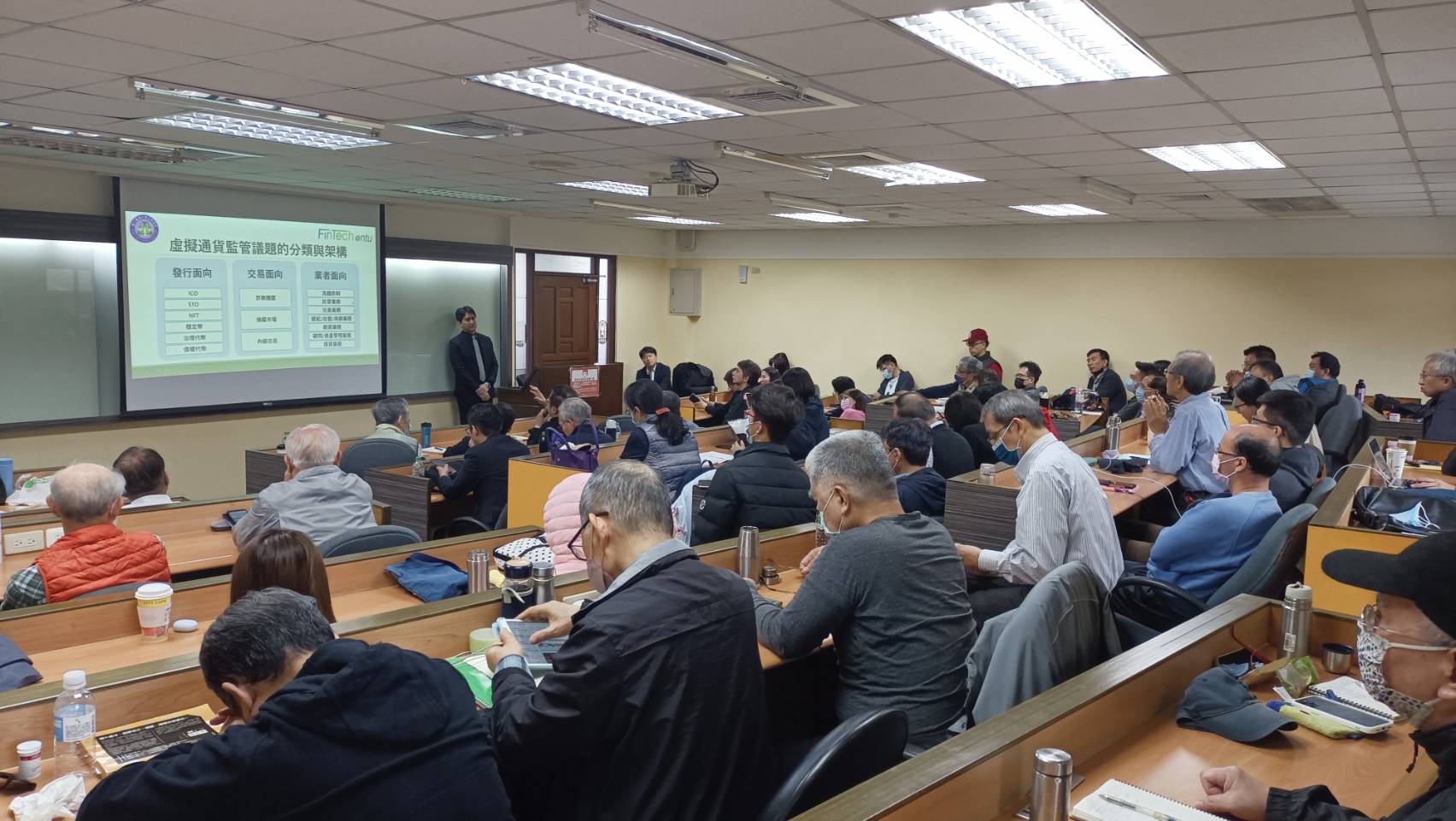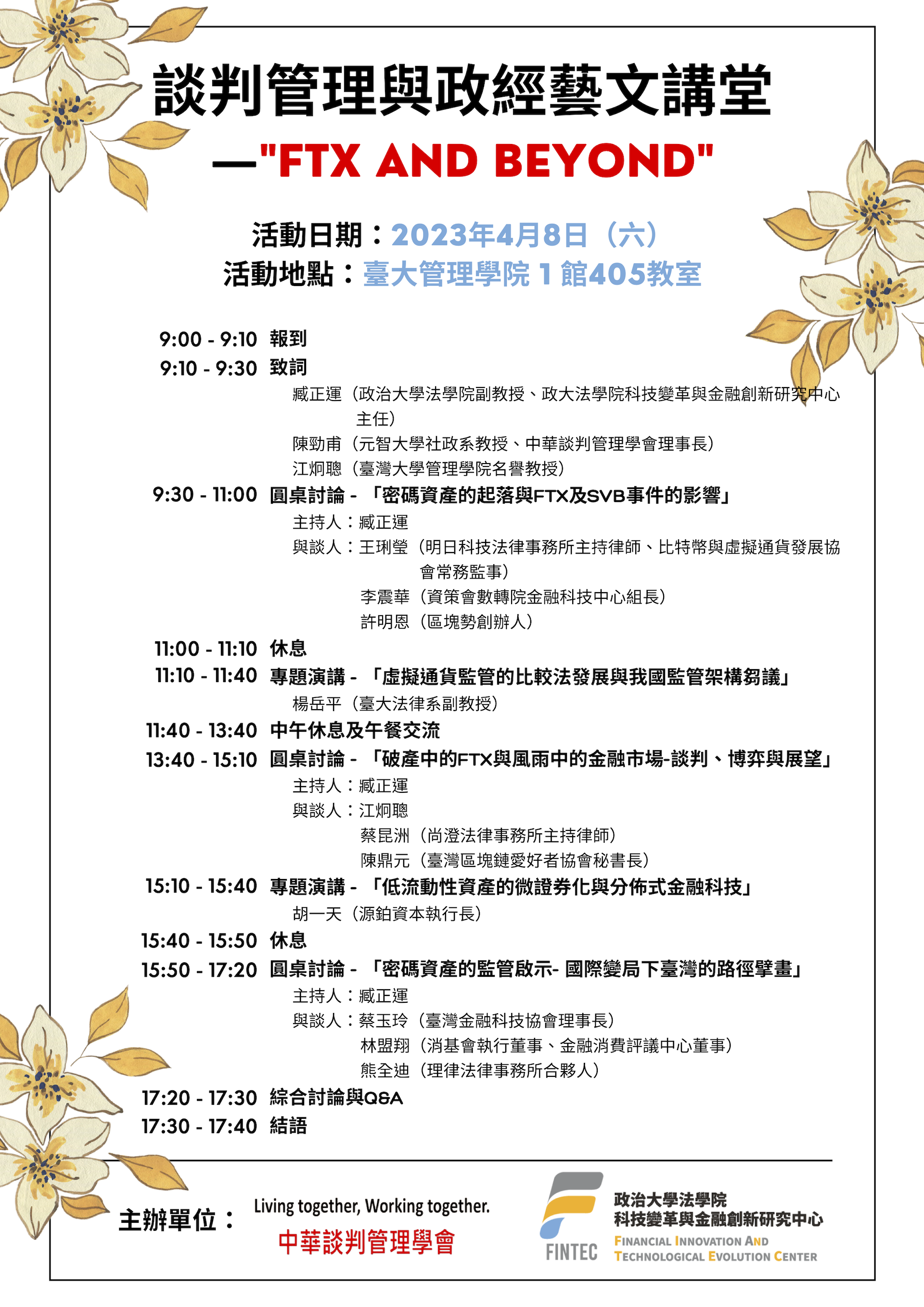The forum was packed to over 150 guests opening by the welcome speeches of Professor Ching-Pu Chen, President of the China Negotiation Association, and Dr. Cheng-Yun Tsang, Director of Financial Innovation and Technological Evolution Center (FINTEC) of NCCU College of Law. Dr. Jong-Tsong Chiang, Emeritus Professor of College of Management NTU, who participated all day despite being not well. A number of scholars and experts attending the meeting reviewed the history of virtual assets and cryptocurrencies through the FTX incident, sorted out the FTX incident and its impact on the financial system and social economy, and discussed the Implications for relevant regulations. They also provide suggestions to the authorities in Taiwan.
In November 2022, FTX, once the world's second-largest cryptocurrency exchange, went from a financial crisis to a run in just a few days, and officially filed for Chapter 11 bankruptcy reorganization proceedings. According to ‘Business Insider’, there may be more than 1 million creditors after bankruptcy, even including well-known media companies and airlines such as New York Times, AA, Netflix, etc. According to statistics, there are more than 100,000 creditors in Taiwan. The lawyer said that due to the related laws and mechanisms are very mature in US and the FTX system has kept detailed account and transaction records, and it is recommended that creditors with smaller amounts of less than US$1 million wait patiently for the debt confirmation notices that will be sent out soon and follow the guidelines for standard procedure.
After FTX filed for bankruptcy reorganization, the storm continued to spread in the market, including bitcoin and other cryptocurrency stocks fell hard, the US Securities Exchange (SEC) and the Department of Justice have launched an investigation into FTX, which has also made the government's strengthening of cryptocurrency governance once again a hot topic. According to the investigation, FTX has misappropriated customer funds, improperly adopted high-leverage investment strategies, and used high-interest rate schemes to conceal insufficient liquidity. Experts at the forum believed that the negative effects caused by the FTX incident will eventually be resolved. The fact is that crypto natives are still convinced that the crypto asset investments are more attractive than traditional finance. The funds will return to investment due to limited investment targets, and some funds even come from traditional financial institutions. However, the FTX incident highlights that it is a trading platform but also plays the role of custody, issuance, underwriting, etc., which has far more than traditional exchanges, so the trading is extremely complex and the effective supervision is extremely difficult. As a result, the hidden risks are very obscure and extremely hard to detect at the early stage to avoid expansion. Coupled with the fact that once the crypto asset causes a keyboard run on the extremely fast, it often has a devastating impact on the platform and the asset, and because the number of stakeholders is usually large, it has a greater impact on society. The fundamental issue of this multiple roles must be clarified, otherwise, the similar incidents will eventually happen again.
Looking at the regulatory governance of various countries, including ICO, NFT and other virtual assets, the key is to regulate information opacity, market manipulation, other improper market behaviors, money laundering prevention and custody, brokerage, underwriting, lending and other financial business. The United Kingdom and the United States mainly apply existing securities or electronic stored value regulations, while Japan formulates special regulations under the securities and payment regulatory framework, and the European Union, Thailand and Malta formulate comprehensive special regulations. Professor Alex Yang of NTU Law School suggested that Taiwan should formulate a special law to regulate the issuance of virtual currency and the supervision of operators, the former focusing on information disclosure requirements, and the latter managing customer asset security, financial consumer protection and sound regulations of the trading market for custody, trading and other related businesses.
Jaclyn Tsai, President of Taiwan Fintech Association, emphasized that Taiwan's crypto community is very active, the population of related technology and creative industries is increasing, and teams go to the international market are quite normal. It is urgent to have clear industrial policies and open-minded regulatory thinking from the government. It is recommended to put efforts on creating a friendly environment, innovating regulatory technology, cultivating abundant talents, and supporting the operation of industry self-regulatory conventions, etc. We can learn from the hierarchical financial licensing system in Singapore and Dubai, and strengthen industry self-discipline with reference to Japan's SRO structure. It is expected that this will be the international stage for Taiwan's young generation, and it will also be an opportunity for Taiwan's traditional financial industry to enter the world.
As one of the earliest scholars in Taiwan to study virtual assets and cryptocurrencies, Professor Ryan Lin, Executive Director of the Consumers’ Foundation commented that the authority is expected to be a part of the ecosystem. In response to the rapid development of financial technology, the thinking of regulatory parties should promote the combination of technology and finance from a technology-neutral perspective, design properly hierarchical financial licensing system, and balance the protection of consumer rights. In Taiwan, the initial self-regulatory convention should also comply with the legal norms and regulatory policies to establish an inclusive communication platform promoting interdisciplinary dialogue with the spirit of distributed centralization.
Professor Jong-Tsong Chiang gave the closing speech of the seminar, affirmed the insights of the experts and scholars attending the seminar, thanked the guests for their enthusiastic participation, and looked forward to co-hosting new technology and new finance related activities in the near future.
In November 2022, FTX, once the world's second-largest cryptocurrency exchange, went from a financial crisis to a run in just a few days, and officially filed for Chapter 11 bankruptcy reorganization proceedings. According to ‘Business Insider’, there may be more than 1 million creditors after bankruptcy, even including well-known media companies and airlines such as New York Times, AA, Netflix, etc. According to statistics, there are more than 100,000 creditors in Taiwan. The lawyer said that due to the related laws and mechanisms are very mature in US and the FTX system has kept detailed account and transaction records, and it is recommended that creditors with smaller amounts of less than US$1 million wait patiently for the debt confirmation notices that will be sent out soon and follow the guidelines for standard procedure.
After FTX filed for bankruptcy reorganization, the storm continued to spread in the market, including bitcoin and other cryptocurrency stocks fell hard, the US Securities Exchange (SEC) and the Department of Justice have launched an investigation into FTX, which has also made the government's strengthening of cryptocurrency governance once again a hot topic. According to the investigation, FTX has misappropriated customer funds, improperly adopted high-leverage investment strategies, and used high-interest rate schemes to conceal insufficient liquidity. Experts at the forum believed that the negative effects caused by the FTX incident will eventually be resolved. The fact is that crypto natives are still convinced that the crypto asset investments are more attractive than traditional finance. The funds will return to investment due to limited investment targets, and some funds even come from traditional financial institutions. However, the FTX incident highlights that it is a trading platform but also plays the role of custody, issuance, underwriting, etc., which has far more than traditional exchanges, so the trading is extremely complex and the effective supervision is extremely difficult. As a result, the hidden risks are very obscure and extremely hard to detect at the early stage to avoid expansion. Coupled with the fact that once the crypto asset causes a keyboard run on the extremely fast, it often has a devastating impact on the platform and the asset, and because the number of stakeholders is usually large, it has a greater impact on society. The fundamental issue of this multiple roles must be clarified, otherwise, the similar incidents will eventually happen again.
Looking at the regulatory governance of various countries, including ICO, NFT and other virtual assets, the key is to regulate information opacity, market manipulation, other improper market behaviors, money laundering prevention and custody, brokerage, underwriting, lending and other financial business. The United Kingdom and the United States mainly apply existing securities or electronic stored value regulations, while Japan formulates special regulations under the securities and payment regulatory framework, and the European Union, Thailand and Malta formulate comprehensive special regulations. Professor Alex Yang of NTU Law School suggested that Taiwan should formulate a special law to regulate the issuance of virtual currency and the supervision of operators, the former focusing on information disclosure requirements, and the latter managing customer asset security, financial consumer protection and sound regulations of the trading market for custody, trading and other related businesses.
Jaclyn Tsai, President of Taiwan Fintech Association, emphasized that Taiwan's crypto community is very active, the population of related technology and creative industries is increasing, and teams go to the international market are quite normal. It is urgent to have clear industrial policies and open-minded regulatory thinking from the government. It is recommended to put efforts on creating a friendly environment, innovating regulatory technology, cultivating abundant talents, and supporting the operation of industry self-regulatory conventions, etc. We can learn from the hierarchical financial licensing system in Singapore and Dubai, and strengthen industry self-discipline with reference to Japan's SRO structure. It is expected that this will be the international stage for Taiwan's young generation, and it will also be an opportunity for Taiwan's traditional financial industry to enter the world.
As one of the earliest scholars in Taiwan to study virtual assets and cryptocurrencies, Professor Ryan Lin, Executive Director of the Consumers’ Foundation commented that the authority is expected to be a part of the ecosystem. In response to the rapid development of financial technology, the thinking of regulatory parties should promote the combination of technology and finance from a technology-neutral perspective, design properly hierarchical financial licensing system, and balance the protection of consumer rights. In Taiwan, the initial self-regulatory convention should also comply with the legal norms and regulatory policies to establish an inclusive communication platform promoting interdisciplinary dialogue with the spirit of distributed centralization.
Professor Jong-Tsong Chiang gave the closing speech of the seminar, affirmed the insights of the experts and scholars attending the seminar, thanked the guests for their enthusiastic participation, and looked forward to co-hosting new technology and new finance related activities in the near future.



